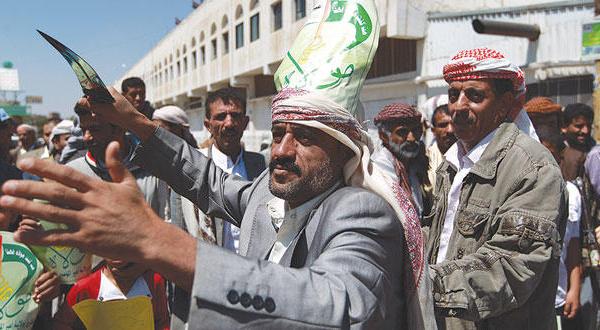Militias are winning the ‘Arab Spring’
Joyce Karam/Al Arabiya
Thursday, 12 February 2015
The images from Yemen where the Houthis ransacked the U.S. embassy in Sanaa yesterday, paralleled with those of Hezbollah fighting the Syrian rebels as Kurdish and Shiite militias take on ISIS in Iraq, confirm a somber reality that militias have gained the most from the Arab Spring upheavals in the Middle East.
The rise of militias in the majority of Arab Spring capitals is unchecked and in some cases has benefitted from the Obama administration hands-off policy towards those countries. This is evident in the latest resolution that Obama sent to Congress to authorize the war against ISIS, which turns a blind eye to new armed groups mushrooming regionally and is only focused on ISIS. This tells us that Washington is increasingly adjusting to a more chaotic and militarized status-quo in the Middle East, and subsequently limiting its goals to counterterrorism and defeating ISIS.
Transition to militias
Evacuating and closing U.S. embassies has become a hallmark of the “Arab Spring” since the street demonstrations broke out in 2011. It started with Syria as the American embassy shut down in Damascus in early 2012, and then Libya following the Benghazi attack and later the photos of militiamen turning the U.S. embassy in Tripoli into a swim club. In Yemen, the closing of the embassy marks the lowest point for U.S. policy in that country since 2011, and puts an end to a “successfully pursued” model that Obama touted last September.
“The new militia structure in Syria, Iraq, Yemen and Libya is here to stay given the decay of the central state structure”
Joyce Karam
Washington had hoped that the Arab Spring would prompt democratic transitions and more inclusive governance in societies wrecked by authoritarian regimes for decades. But with the exception of the Tunisia, the Arab Spring transitions and the Iraq war unleashed a Pandora’s box of extremism and military strife across the broader Middle East. Perhaps the societies were not ready or the international community’s response fell short, but a new political reality is settling in, giving the upper hand to militias over central governments and institutions.
Today in Syria, while the President Bashar al-Assad is parading his country’s sovereignty in the Western media, Hezbollah and Israel are engaging in a tit-for-tat in Quneitra while Kurdish forces and the Free Syrian Army are taking on ISIS in Kobane. In Yemen, all the state institutions have surrendered in countering the Houthis and their allies. This new dynamic is also materializing in Shiite and Kurdish militias taking a bigger role in Iraq and the proliferation of all kinds of armed groups, from tribal to ISIS, based in Libya. The new drawing board makes the central authorities in Baghdad, Tripoli, Damascus and Sanaa almost irrelevant as the self-governing capabilities of these militias gain more strength and momentum.
The West adjusts
Against this reality and a strong inclination on the part of both the Obama administration and the European capitals to keep distance from the intra-Arab conflicts, Washington and its European allies are slowly adjusting themselves to the new militia-driven status quo.
While the U.S. has started equipping and training a Syrian rebel force, Obama praised Germany for following suit in Iraq. In his press conference with German Chancellor Angela Merkel this week, Obama pointed to a “significant milestone” in Germany’s foreign policy in “equipping Kurdish forces in Iraq” and “ preparing to lead the training mission of local forces in Arbil.” The day before Obama and Merkel met, French President Francois Hollande hosted in the Elysee a group of Kurdish fighters including the Co-Chair of the Women Protection Units (YPJ) commander Nasrin Abdullah.
Both Obama’s new national security strategy and the authorization sent to Congress don’t address the armed militias quandary but rather use it to fight ISIS or al-Qaeda and its affiliates. The U.S. will attempt to institute some of the armed groups either in the Iraqi army or under the umbrella of the moderate Syrian rebels to fight ISIS, while continuing to support Kurdish rebels and ignoring the Shiite militias sponsored by Iran. Counterterrorism has climbed up to the top of U.S. priorities in the Arab Spring capitals, including Cairo where security and military cooperation continues with President Abdel Fattah al-Sisi.
Even if ISIS is defeated or if al-Nusra or Asaib Ahl al-Haq change their names and affiliations, the new militia structure in Syria, Iraq, Yemen and Libya is here to stay given the decay of the central state structure and the degree of chaos and deepening conflict in those countries. Adaptation and containment while dismantling threats to U.S. national security define Washington’s approach to the post-Arab Spring tumult as another U.S. embassy goes on lock down.























